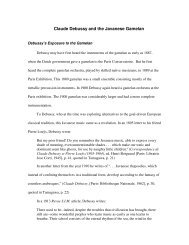Music Preference 1 - Brent Hugh's personal and business web pages
Music Preference 1 - Brent Hugh's personal and business web pages
Music Preference 1 - Brent Hugh's personal and business web pages
You also want an ePaper? Increase the reach of your titles
YUMPU automatically turns print PDFs into web optimized ePapers that Google loves.
<strong>Music</strong> <strong>Preference</strong> 54<br />
subgroups within the recital audience may react in different ways. Perhaps more sophisticated<br />
audiences prefer a different type of verbal introduction, or no introduction at all.<br />
8. The long-term effect of informational presentations on music preference could be studied.<br />
Do the effects of the treatments last beyond the class or recital in which they were given? If not,<br />
then what strategies might be adopted to affect music preference in the long term?<br />
Conclusion<br />
This investigation shows that musicians <strong>and</strong> educators can influence the musical preferences<br />
of students <strong>and</strong> audience members. Performers should be encouraged to know that relatively<br />
simple presentations can influence audience members to have a greater preference for the music<br />
they perform. Educators, too, should know that they can influence <strong>and</strong> broaden the musical tastes<br />
of their students <strong>and</strong> that research shows that there are many good reasons to do so. Students who<br />
develop broader musical tastes <strong>and</strong> who are slower to harden their musical prejudices are more<br />
likely to develop deep, precise, <strong>and</strong> accurate knowledge of music <strong>and</strong> musical styles (Mok,<br />
2000). These students are likely to develop into musical omnivores whose underst<strong>and</strong>ing <strong>and</strong><br />
acceptance of a wide range of musics leads them to a greater underst<strong>and</strong>ing <strong>and</strong> acceptance of a<br />
variety of cultures <strong>and</strong> cultural values (Peterson & Kern, 1996; Bryson, 1996).<br />
Research has shown that breaking down musical prejudice is an important tool in reducing<br />
cultural prejudice; this investigation demonstrates that musicians <strong>and</strong> teachers can indeed affect<br />
listeners' musical prejudices.





